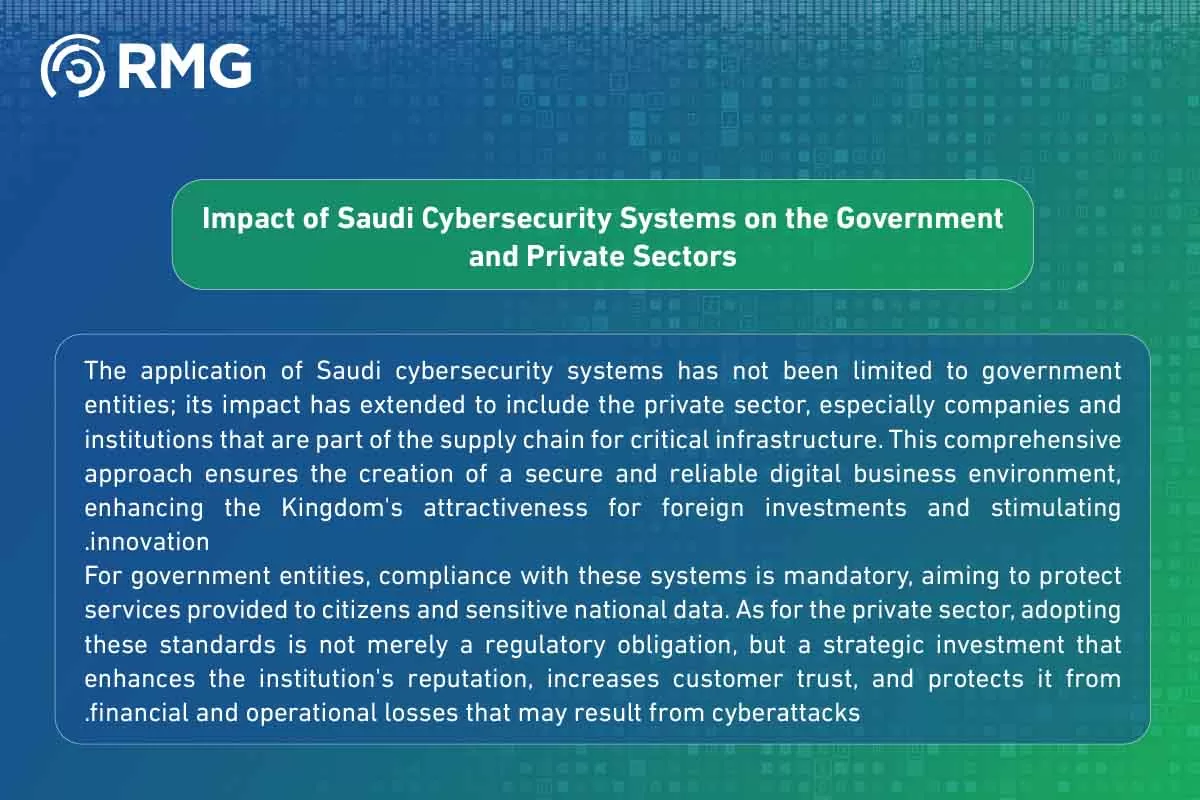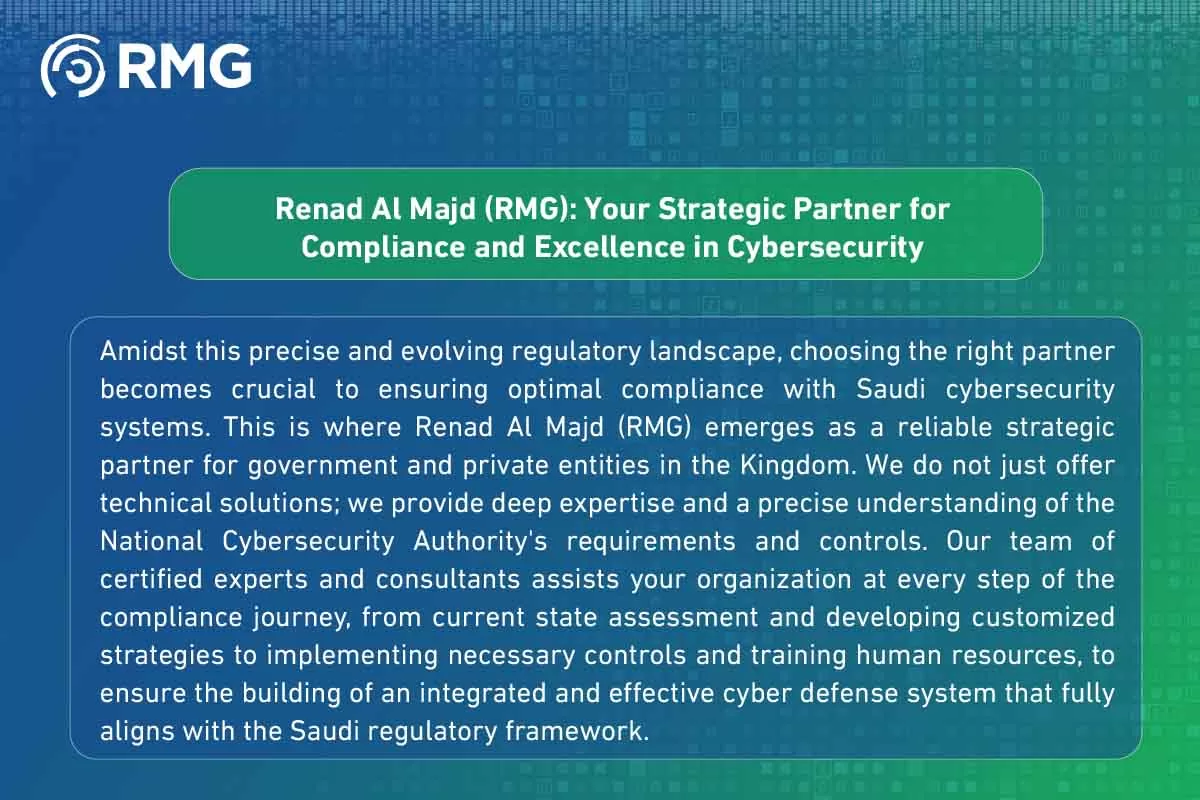Blog Body
Discover how Saudi cybersecurity systems form a protective shield for government and private institutions. Learn about the most prominent controls and legislations and their pivotal role in building a secure and prosperous digital economy at the heart of the Kingdom.
In light of the rapid digital transformation witnessed by the Kingdom of Saudi Arabia, a pressing need has emerged to build a robust cybersecurity defense system capable of protecting national and institutional assets. This is where the role of Saudi cybersecurity systems comes in, which are no longer merely a technical option but have become a fundamental strategic pillar to ensure business continuity, protect sensitive data, and enhance trust in the Saudi digital space. These integrated systems, developed under the direct supervision of supreme regulatory bodies, represent the unified national framework that ensures raising the level of cybersecurity maturity across the entire Kingdom.
The National Cybersecurity Authority: The Cornerstone of the Digital Protection System
The National Cybersecurity Authority (NCA) stands at the heart of Saudi cybersecurity systems, taking on the regulatory and legislative role to protect the Kingdom’s cyber space. The authority was established with the aim of setting the necessary policies, frameworks, and standards, disseminating them to all national entities, and monitoring compliance. The NCA works to enhance cybersecurity at the national level, protecting government networks, systems, data, and critical infrastructure from increasing threats. The existence of a central entity of this size and strength ensures the unification of efforts, coordination of incident response, and the building of specialized national capabilities capable of effectively and efficiently confronting future cyber challenges.
Essential Cybersecurity Controls (ECC): A Roadmap for Enhancing Cyber Resilience
The “Essential Cybersecurity Controls (ECC)” are the most important document within Saudi cybersecurity systems. These controls represent a comprehensive set of requirements that all government entities and private sector organizations that own or operate sensitive national infrastructure must adhere to. These controls are designed to serve as a first and integrated line of defense, aiming to minimize cyber risks and ensure readiness to deal with any incidents that may occur.
What are the main areas of the Essential Cybersecurity Controls?
The controls consist of several key areas, each covering a vital aspect of cybersecurity, providing a comprehensive and multi-layered approach to protection. These areas include:
- Cybersecurity Governance: This area focuses on establishing policies and procedures, defining roles and responsibilities, strategically managing cyber risks, and ensuring compliance with legislations.
- Cybersecurity Enhancement: This pillar addresses the application of best practices and technical solutions to protect information and technology assets, such as identity and access management, network security, and device and software protection.
- Cyber Threat Defense: This area specializes in continuous monitoring of networks and systems to detect any suspicious activities, managing security vulnerabilities, and proactively responding to cyberattacks.
- Cybersecurity Resilience: This area aims to ensure business continuity and rapid recovery in the event of cyber incidents, by developing effective incident response plans and backup management.
- Third-Party and Cloud Computing Cybersecurity: With the increasing reliance on external vendors and cloud services, this area sets strict controls to ensure the security of data and services managed through third parties.

Impact of Saudi Cybersecurity Systems on the Government and Private Sectors
The application of Saudi cybersecurity systems has not been limited to government entities; its impact has extended to include the private sector, especially companies and institutions that are part of the supply chain for critical infrastructure. This comprehensive approach ensures the creation of a secure and reliable digital business environment, enhancing the Kingdom’s attractiveness for foreign investments and stimulating innovation.
For government entities, compliance with these systems is mandatory, aiming to protect services provided to citizens and sensitive national data. As for the private sector, adopting these standards is not merely a regulatory obligation, but a strategic investment that enhances the institution’s reputation, increases customer trust, and protects it from financial and operational losses that may result from cyberattacks.
Compliance Requirements: A Shared Responsibility Towards a Secure Cyber Space
Achieving full compliance with Saudi cybersecurity systems requires organized effort and a clear vision from institutional leadership. It is not limited to purchasing the latest technologies but extends to building an institutional culture aware of cyber risks. The compliance journey begins with a precise Gap Analysis to determine the current situation and compare it with the requirements of the National Cybersecurity Authority. Based on this assessment, an integrated action plan is developed, including policy development, technical control implementation, employee training, and regular penetration testing. It is a continuous journey of improvement and development to ensure the institution remains in a state of full readiness.
Strategic Dimensions of Cybersecurity Systems: Beyond Mere Technical Protection
The importance of Saudi cybersecurity systems transcends technical protection to touch strategic, economic, and social dimensions. They directly contribute to:
- Building Digital Trust: Enhancing the confidence of citizens, investors, and international partners in the Saudi digital environment.
- Enabling the Digital Economy: Providing a secure environment that allows new economic models based on data and emerging technologies to flourish.
- Protecting Critical Infrastructure: Ensuring the continuity of vital sectors such as energy, water, telecommunications, financial, and health services.
- Achieving Digital Sovereignty: Enhancing the Kingdom’s ability to protect its cyber space and manage its digital resources in a way that serves its supreme national interests.
Renad Al Majd (RMG): Your Strategic Partner for Compliance and Excellence in Cybersecurity
Amidst this precise and evolving regulatory landscape, choosing the right partner becomes crucial to ensuring optimal compliance with Saudi cybersecurity systems. This is where Renad Al Majd (RMG) emerges as a reliable strategic partner for government and private entities in the Kingdom. We do not just offer technical solutions; we provide deep expertise and a precise understanding of the National Cybersecurity Authority’s requirements and controls. Our team of certified experts and consultants assists your organization at every step of the compliance journey, from current state assessment and developing customized strategies to implementing necessary controls and training human resources, to ensure the building of an integrated and effective cyber defense system that fully aligns with the Saudi regulatory framework.
Why Choose Renad Al Majd to Strengthen Your Cyber Defenses?
Choosing Renad Al Majd (RMG) means choosing local expertise with global standards. We understand that every organization has its unique challenges, which is why we offer tailored solutions to meet your precise needs. Our consulting and implementation services aim not only to help you pass audits but also to embed a culture of cybersecurity as an integral part of your organization’s identity. We invite you today to contact the Renad Al Majd team to explore how we can help you transform compliance challenges into an opportunity to enhance your digital resilience and fortify your vital assets. Join our list of successful partners and start your journey towards a more secure and confident digital future.





















